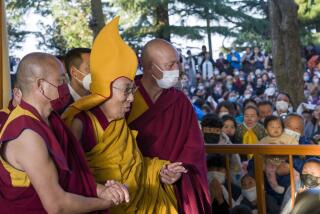Who Is the Dalai Lama? : The Chinese make a political issue of a religious leader.
- Share via
The Dalai Lama is coming to Washington and Beijing is fuming.
The Tibetan religious leader’s upcoming visit is causing a stir in both capitals because he will speak to a group of congressional members, including House Speaker Thomas S. Foley (D-Wash.) and Senate Majority Leader George J. Mitchell (D-Me.), in the Capitol Rotunda on April 18.
The very image is an affront to Beijing. It has long considered the Dalai Lama, who fled to India in 1959, an archenemy--”an exile who engages in political activities aimed at splitting the motherland.”
The Dalai Lama, winner of the 1989 Nobel Peace Prize, rejects Beijing’s contention that Tibet has always been under Chinese sovereignty. In fact, Tibet was independent from 1911 until 1950 when China’s new Communist government moved in troops. The world winked at the infringement 41 years ago--unlike the international condemnation that quickly followed Iraq’s invasion of Kuwait last August.
Washington, particularly the Administration, is hardly on the brink of recognizing Tibet’s sovereignty. But the Dalai Lama’s Washington appearance is not likely to help U.S.-Sino relations, recently strained by differences over Beijing’s trade and human rights policies.
Beijing already has tried to dissuade some hosts of the Dalai Lama’s monthlong U.S. tour, which includes a visit today to UCLA. Chinese authorities, for example, sent a letter to the president of the Massachusetts Institute of Technology objecting to the Dalai Lama’s participation in a program last month. MIT stood fast, rightly championing free expression.
Chinese authorities apparently are worried that the Dalai Lama’s Washington visit might cause bloody riots back in his homeland. That happened the last time some members of Congress received the Dalai Lama in Washington in 1987.
The Dalai Lama is a religious figure, respected and recognized worldwide. He symbolizes not only the fate of his Tibetan homeland but, sadly, Beijing’s continuing repression of human rights and expression.
More to Read
Sign up for Essential California
The most important California stories and recommendations in your inbox every morning.
You may occasionally receive promotional content from the Los Angeles Times.













